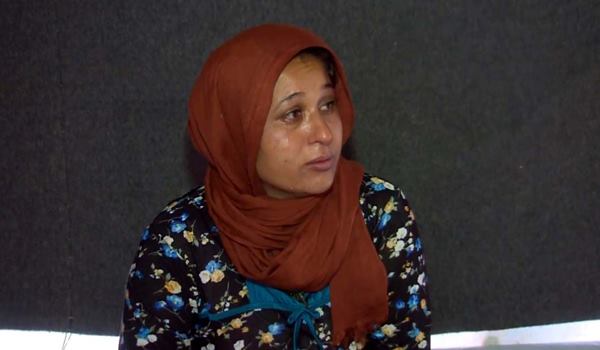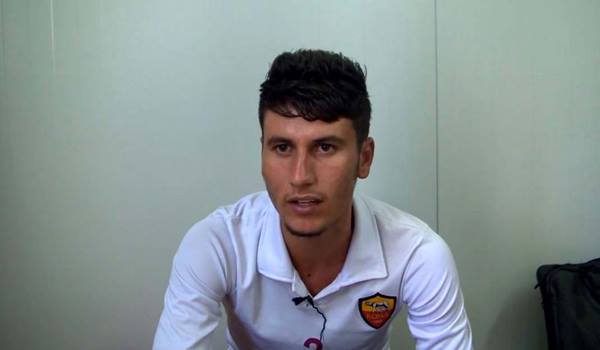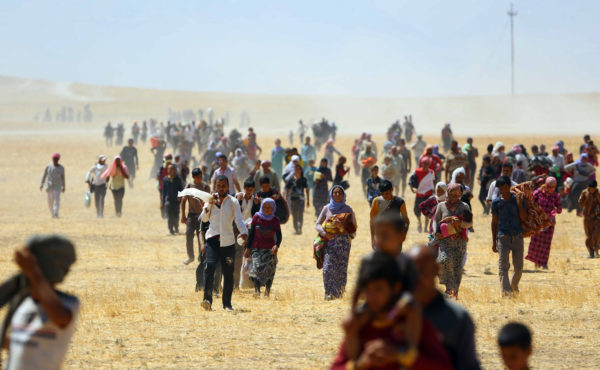On the commemoration day of the massacre of the Ezidis at the Kocho village in Shingal district (west of Mosul City), two witnesses convey part of the gruesome details of what the villagers went through that day.
The young survivor Basma Elias, who was kidnapped by ISIS for more than a year, was transferred from her village to the al-Ba'aj subdistrict and from there to Tal-Afar, to be finally transferred to Raqqa. As for the other witness from that devastated village, Shawqi Haidar, his life was saved by a mysterious phone call.
Fear and anticipation pervade the village
Basma said in her interview with Kirkuk Now: “At ten o'clock in the morning of 3 August 3 2014, we heard that a car belonging to ISIS militants had entered the village and headed to the house of the village commissioner, Nayef Jaso. But prior to that, we had heard that all the settlements, the southern villages and the Shingal district had fallen, that ISIS militants committed massacres against civilians, and that our village and the village of al-Hatimiya, which is located about 5 km from ours.”
We couldn’t believe that they had taken the women and children. Fear and anxiety swept through all the people of the village
Basma continued: “We couldn’t believe that they had taken the women and children. Fear and anxiety swept through all the people of the village. Hours later, my brother Ibrahim came and told us that ISIS reassured the commissioner and asked him to inform the people to stay in their homes and not leave, and that they are safe except for personnel of the police and the army."
“At three o'clock on the same day, a number of cars carrying armed ISIS militants came and started driving around in the village. They asked the people to hand over their weapons, and that death would be the fate of those who wouldn’t obey that, so the youths kept surrendering their weapons all day long under instructions from the commissioner, because he had negotiated with them in this regard. That night, dozens of families managed to leave the village towards the mountain.”

Duhok, August 2017 – Basma Ilias from Kocho village – Photo by Muhanad Shingali
Regarding the reasons for not fleeing the village before and after ISIS entered Shingal, Basma replied: “From what I heard from my husband and the rest of the people, there was contact with the rest of the Arab tribes near the village, and they had promised that ISIS militants would not enter the village nor would they have any business with civilians. Most of the people [from our village] were on good terms with the villages, and we had a friendly relationship with them, but we did not expect them to betray us in this brutal way.”
"After some long days filled with fear and anxiety, we would hear about what ISIS had done to Ezidis. And we would hear that they had instructed the village commissioner that all the people of the village must declare their conversion to Islam in exchange for lives, and that they would treat us like the rest of the Muslims under the rule of their Sharia.”
Basma continued: “Two nights before the massacre was committed, contact was made with the people of Hatimiya village near Kocho. The villagers in Hatimiya had not left for the same reasons. The commissioner of Hatimiya village had asked Kocho’s commissioner, Nayef Jaso, to agree on a date to escape, but the latter refused because the village was under surveillance [by ISIS].”
Betrayal of pledges
Basma added: "On 14 August, we woke up to see dozens of ISIS cars roaming the village. They were hysterical and firing in the air. We then learned that the people of Hatimiya had fled their village towards the mountain the night before. This forced them to intensify surveillance on the village and their tone became harsher, making threats that they would kill everyone.”
On the next morning, precisely at 10 o’clock, according to Basma: “About 60 armed men entered the village, led by abu-Hamza al-Khatouni from the Baliju subdistrict, under orders of the ISIS governor of Mosul, Radhwan Talib al-Hamdoun.”
Basma continued: “The gunmen gathered the people in Kocho School. At first, they asked us to hand over our phones, money and all our jewellery. I was with about 150 women and children being held in one of the buildings, and some of the gunmen told us that they would kill the men and take the women as sex slaves.
As they brought transport trucks to put us in them, during those moments we saw many bodies lying on the ground, including my brother Ibrahim
We were begging them amid the wailing and the crying of the children. At 12:30 o'clock we heard the sound of gunfire from different places in the village. As they brought transport trucks to put us in them, during those moments we saw many bodies lying on the ground, including my brother Ibrahim. After that they took us to al-Ba'aj subdistrict and from there to Tal-Afar.”
A year after her abduction, Basma’s family managed to free her through smugglers in exchange for a sum of money, as she was held as sex slave by a Saudi ISIS militant in the Syrian city of Raqqa.
A phone call saved his life
Another witness from Kocho is Shawqi Haider. He told KirkukNow: “After ISIS learned that the people of Hatimiya village had fled to the mountain, they arrested the youth on the evening of 14 August. We were then transferred from the Kocho to the district of Shingal, where we were held captive at a municipal office building for two days.

Duhok, August 2017 – Shawqi Haidar from Kocho village – Photo by Muhanad Shingali
We were more than 85 people, our ages ranged from 16 to 60 years. At one o'clock after midnight, they tied our hand behind our backs and lined us up against the wall of the building, readying us for execution. But a mysterious phone call came in the last moments before the execution, postponing our death.”
Shawqi continued: “In early morning of the next day, ISIS members mentioned to us that they had killed all the people of the village and taken the women as sex slaves, and started mocking us, telling us that we deserve to be killed because we are misguided and that we are infidels. They shot bullets over our heads and between our feet, and pledged that they would slaughter us sooner or later.”
We saw how they dragged girls by their hair and took them in front of their families' eyes. They took mothers with their children and took even girls under the age of ten
After that, they transferred the young Ezidis, including Shawqi, to the Kasr al-Mihrab prison, and some others were transferred to the Qizilkand prison in the Tal-Afar subdistrict. There, Shawqi learned of what happened in his village. He said: "We saw how they dragged girls by their hair and took them in front of their families' eyes. They took mothers with their children and took even girls under the age of ten."
Answering the question about why they didn’t flee like the villagers of Hatimiya and the rest of Shingal district, Shawqi replied: “Our village is surrounded by Arab villages that have betrayed us, and the village commissioner had negotiated with them and was given a promise not to harm us and not to attack the village in exchange for not fleeing and converting to Islam.”
Shawki managed to escape along with a number of his friends while they were forced to dig trenches for ISIS near the Kasr al-Mihrab prison.







